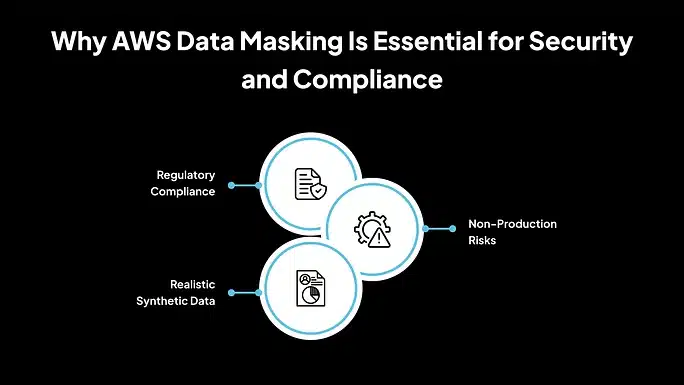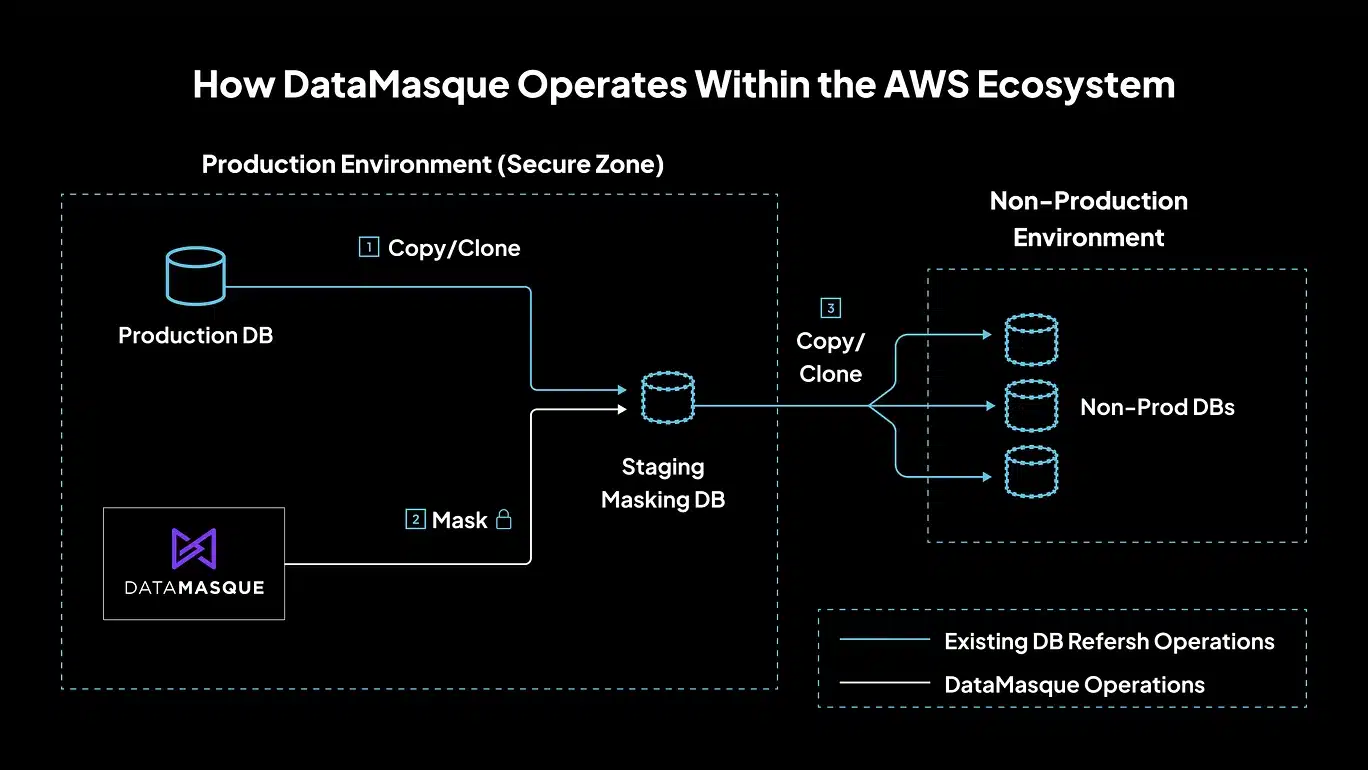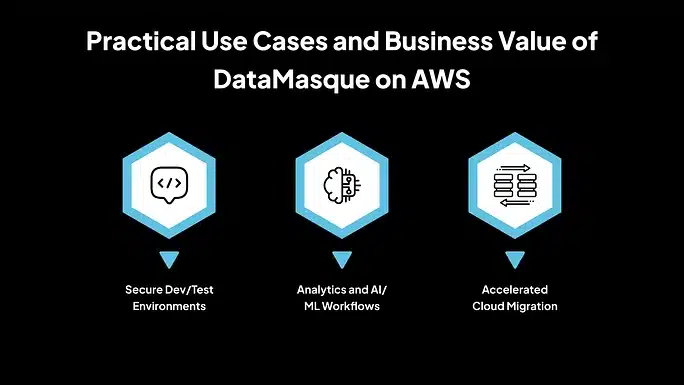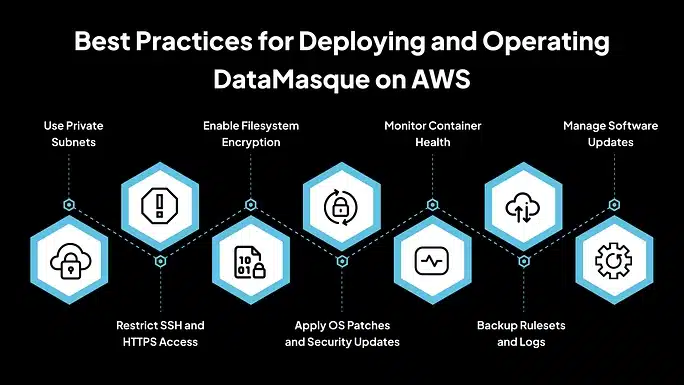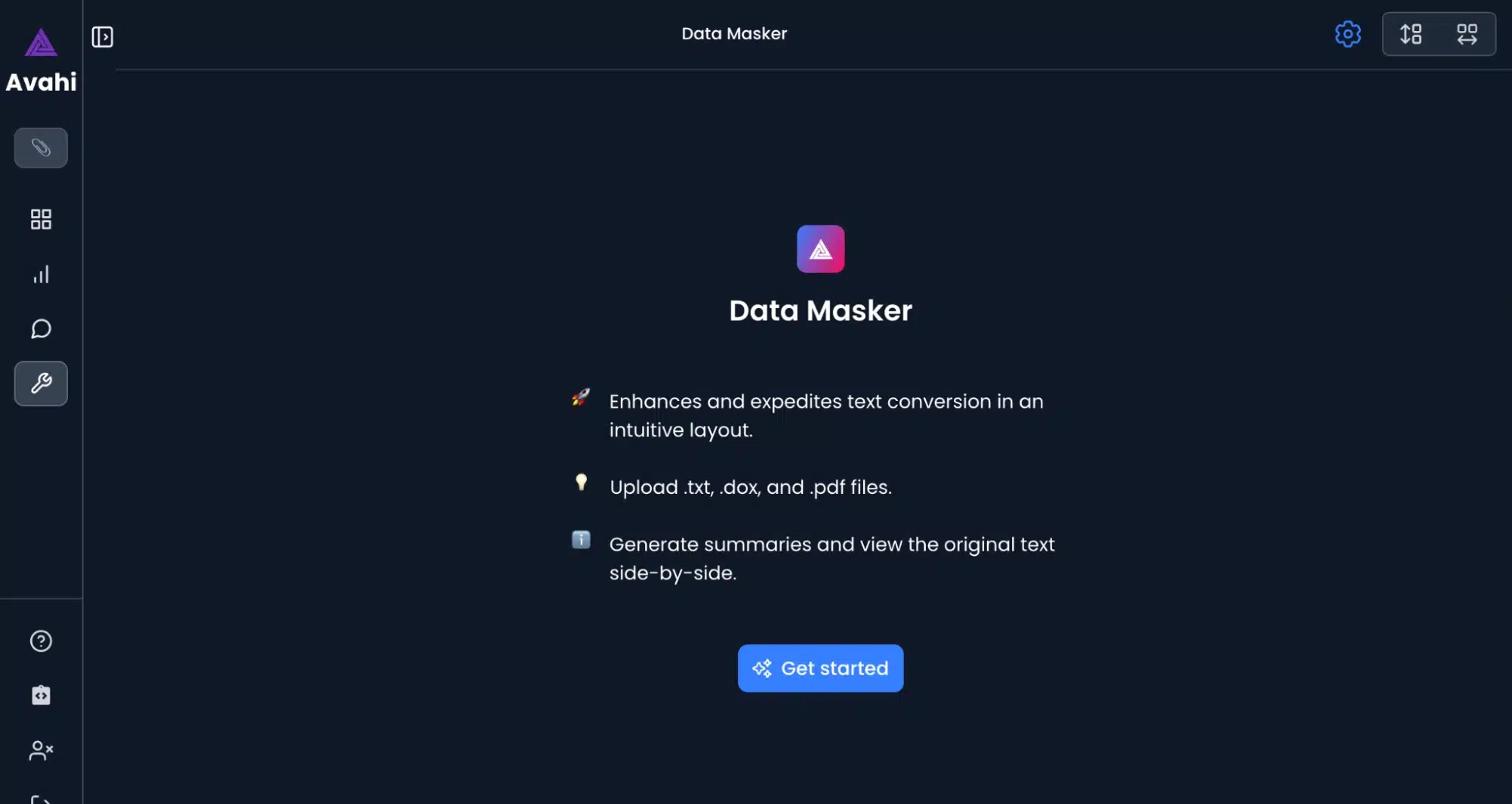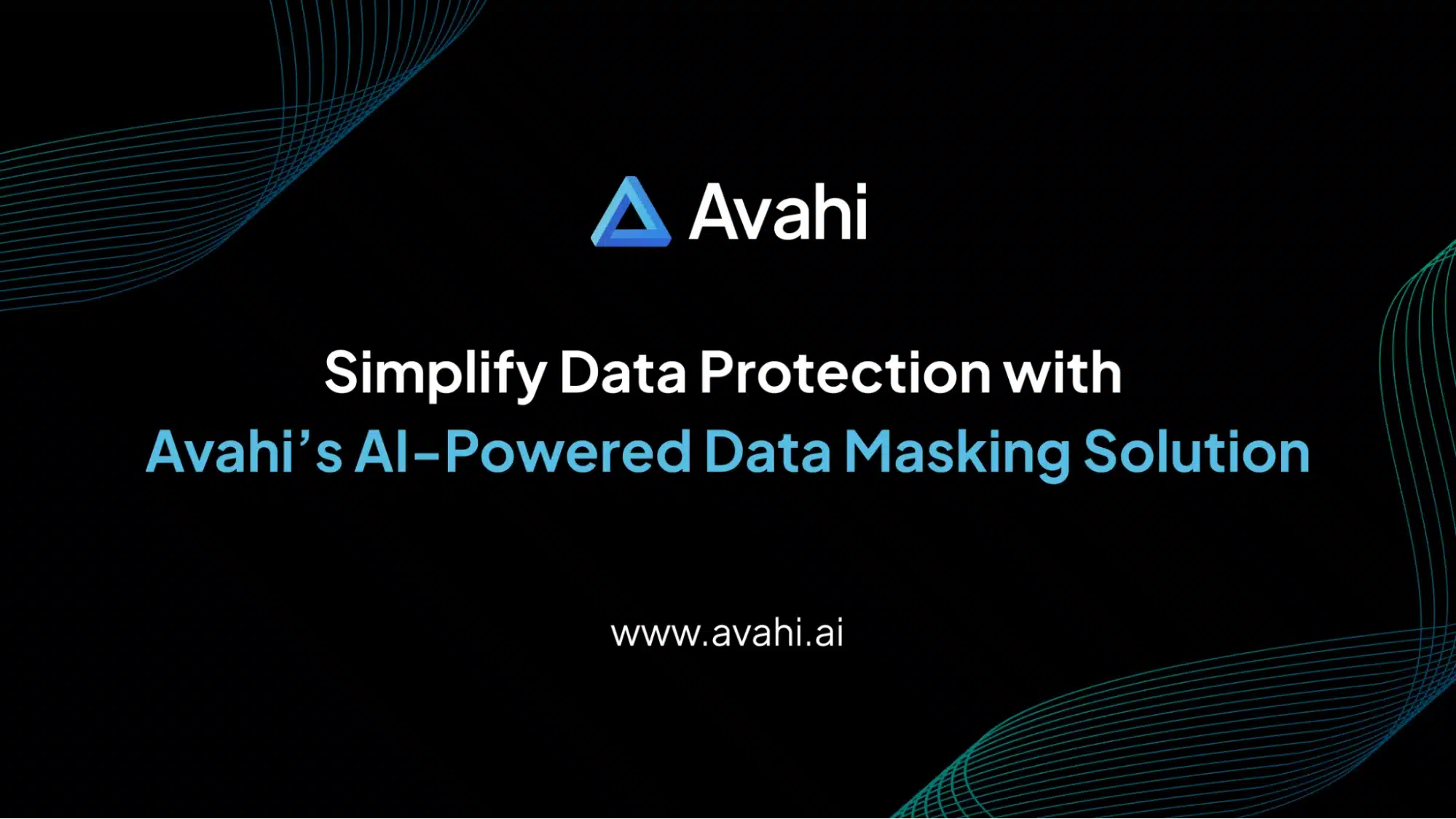A recent study by Gartner predicts that by 2026, 75% of the world’s population will have their data protected under privacy regulations. At the same time, a recent Delphix report reveals that 54% of organizations have suffered data breaches in non‑production environments, and 86% permit data compliance exceptions in testing and QA contexts.
This combination creates a high-risk scenario: sensitive production data is being copied, shared, and used in places it was never intended to be.
Data masking addresses this risk directly by replacing sensitive values, such as names, emails, or financial details, with realistic yet non-identifiable data. It enables developers, analysts, and data scientists to work productively, without ever handling live data that could trigger compliance violations or security incidents.
This is where DataMasque comes in. Built for cloud environments like AWS, DataMasque automates the discovery and masking of sensitive data across structured and semi-structured sources, ensuring compliance without disrupting operational workflows.
In this blog, we’ll explore why AWS data masking is essential for secure and compliant AWS operations and how DataMasque fits into modern data pipelines and dev/test environments.
Whether you’re preparing data for QA teams, machine learning models, or migrating workloads to the cloud, this guide will show you how to protect your data without slowing down innovation.
Understanding DataMasque: A Purpose-Built Solution for AWS Data Masking
DataMasque is a specialized data masking solution designed to protect sensitive information, including Personally Identifiable Information (PII), Protected Health Information (PHI), and payment data. It is primarily used to generate realistic, de-identified datasets for development, testing, analytics, and AI training, without exposing live production data.
The primary goal of DataMasque is to secure sensitive data by transforming it into masked, synthetic data that cannot be reverse-engineered. This ensures that businesses can safely use data replicas in non-production environments while maintaining data utility for functional tasks. Here is the list of some of the key capabilities of DataMasque:
1. Sensitive Data Discovery
DataMasque includes built-in detection rules for identifying sensitive data across a wide range of source systems. It can also be configured with custom discovery rules to align with organizational needs or compliance requirements.
It includes predefined patterns for names, emails, credit card numbers, dates, and other standard identifiers and discovery works across various databases and file types, reducing manual effort.
2. Flexible Data Masking
Once sensitive data is identified, DataMasque applies irreversible masking techniques to ensure privacy. Methods include hashing, randomization, format-preserving masking, and custom substitution rules. The masked data retains realistic structure and referential integrity, meaning relationships between data columns (e.g., user ID and email) remain logically consistent.
3. Support for Structured and Semi-Structured Data
DataMasque supports both structured (e.g., relational databases) and semi-structured (e.g., JSON, XML, CSV) formats. Compatible with platforms like PostgreSQL, MySQL, Oracle, SQL Server, and Amazon RDS. File-based masking allows processing of flat files, logs, or exported datasets from enterprise applications.
4. Deployment on AWS
DataMasque is available on the AWS Marketplace as a pre-configured Amazon Machine Image (AMI) that runs on Amazon EC2. This makes it easy to deploy within AWS environments with minimal setup.
It integrates with AWS services like Secrets Manager, Step Functions, and CloudFormation for automation. Suitable for on-demand or scheduled masking tasks in both cloud-native and hybrid environments.
Why AWS Data Masking Is Essential for Security and Compliance
Data masking is a crucial component of modern data security and compliance strategies, particularly in cloud environments such as Amazon Web Services (AWS). As businesses migrate their infrastructure and workloads to AWS, they need to ensure that sensitive data is protected at every stage of storage, processing, and testing. Here’s why data masking is essential on AWS:
1. Regulatory Compliance
Organizations handling sensitive data must comply with regional and industry-specific regulations. These regulations require that personal and confidential data is not exposed in ways that could lead to unauthorized access or misuse.
GDPR (General Data Protection Regulation) mandates the protection of personal data for EU citizens. HIPAA (Health Insurance Portability and Accountability Act) sets strict guidelines on safeguarding Protected Health Information (PHI) in the healthcare sector.
CCPA (California Consumer Privacy Act) provides privacy rights and protections for California residents. PCI-DSS (Payment Card Industry Data Security Standard) ensures the secure handling of credit card and payment data.
Using data masking solutions like DataMasque helps organizations on AWS meet these regulatory requirements by converting sensitive data into de-identified formats that retain usefulness but eliminate exposure risks.
2. Non-Production Risks
Many development, testing, and analytics teams require access to data that reflects production conditions. However, using actual production data in non-production environments introduces serious risks such as exposure of personal or financial data to internal users, vendors, or third-party contractors.
Increased attack surface, as development and test environments are often less secure than production systems, and accidental data leaks through backups, logs, or misconfigured access controls.
Masking production data before using it in test, development, or training environments significantly reduces the risk of data breaches and accidental disclosures, while still providing usable, representative data.
3. Realistic Synthetic Data
One of the key advantages of data masking with tools like DataMasque is the generation of synthetically accurate data. This masked data mirrors the structure and logic of the original, without containing actual sensitive values.
Developers and QA engineers can work with datasets that resemble production data, enabling them to validate performance, usability, and error handling accurately. Machine learning models trained on realistic but anonymized data retain performance quality while reducing compliance concerns.
Business intelligence tools can process masked datasets to derive insights, trends, and forecasts, without violating data privacy rules. This allows teams to maintain productivity and accuracy across cloud-native workflows on AWS without compromising data privacy or security.
How DataMasque Operates Within the AWS Ecosystem
DataMasque integrates seamlessly with AWS infrastructure to provide automated, secure data masking. It is designed to be easy to deploy, scalable across environments, and adaptable to different compliance requirements. Below is a breakdown of how it works across various areas:
1. Deployment Options
AWS Marketplace AMI (Amazon Machine Image)
DataMasque is available as a pre-built AMI on the AWS Marketplace. Users can quickly launch the solution on an EC2 instance using either a free trial, Bring-Your-Own-License (BYOL) options, or flexible hourly/monthly pricing options. This makes it accessible for both short-term evaluation and long-term implementation within cloud workflows.
Integration with EC2 Image Builder
For organizations that regularly create and update EC2 instances, DataMasque can be integrated into the EC2 Image Builder pipeline. This enables automated masking of data as part of image creation, helping to standardize secure environments across development or test deployments.
2. Data Discovery and Rulesets
Sensitive Data Discovery
DataMasque automatically scans connected databases and files to identify sensitive data. It comes with built-in detection rules for common data types, including names, emails, government IDs, phone numbers, credit card numbers, and health information. Additionally, users can define custom patterns to meet specific regulatory or business requirements.
Ruleset Creation and Use
Once sensitive fields are identified, masking rules are configured using YAML-based rulesets. These rule sets specify which columns or fields should be masked and which masking methods to apply. Rulesets are reusable, version-controlled, and can be used to multiple environments for consistent protection across all environments.
Masking Engine and Masking Types
DataMasque supports a variety of irreversible masking techniques to ensure data privacy while maintaining usability. SHA‑512 Salted Hash converts original values into fixed, non-reversible hashes. Randomization & Frequency-Based Masking generates new values that mimic the statistical distribution of the original data.
Date Retention Rules offsets or randomizes dates while preserving intervals or sequences.
Choice-Based masks replace values with entries from a predefined list or pattern, useful for fields like department names or regions.
Each technique is selected based on the data type and the use case, ensuring compliance without disrupting business workflows.
3. Maintaining Integrity
To ensure that masked data remains functionally valid, DataMasque preserves referential integrity and data relationships. DataMasque can mask identifiers such as customer IDs while maintaining uniqueness.
It ensures that foreign key relationships (e.g., user IDs linked across multiple tables) remain intact, allowing applications and queries to continue working correctly with masked data.This feature is critical for development, testing, and analytics teams that rely on consistent and interconnected datasets.
Practical Use Cases and Business Value of DataMasque on AWS
DataMasque offers a practical solution for securely managing sensitive data across various cloud environments. Below are the essential use cases that demonstrate how organizations benefit from its masking capabilities, especially within the AWS ecosystem.
1. Secure Dev/Test Environments
One of the most common applications of DataMasque is enabling development and testing teams to work with data that reflects real production conditions, without exposing actual sensitive information.
Developers and QA teams often require full access to database structures and data relationships to debug or validate features. Using unmasked production data in these environments creates a security risk and violates compliance standards.
With DataMasque, organizations can generate functionally accurate, masked datasets that preserve format and structure, allowing teams to perform realistic testing without compromising data privacy. This improves development efficiency while reducing legal and security risks.
2. Analytics and AI/ML Workflows
Organizations increasingly use sensitive data to power dashboards, analytics pipelines, and machine learning models. DataMasque enables them to do so without exposing raw personal data.
Data scientists and analysts can work with synthetically identical masked data that mirrors real patterns and distributions. This ensures that predictive models and statistical analyses remain valid while complying with data protection laws, such as GDPR or HIPAA.
Business Intelligence teams can generate accurate reports and dashboards based on masked datasets, even without access to raw PII. This enables the safe extraction of insights and the training of models in a privacy-conscious manner.
3. Accelerated Cloud Migration
During cloud migration, transferring raw production data to cloud services like Amazon RDS or Amazon S3 introduces compliance and security challenges.
DataMasque can be deployed to mask sensitive data before or during the migration process.
This ensures that masked datasets are migrated, reducing the risk of accidental exposure or breaches during the transition.
Organizations can move faster while meeting internal data governance standards simultaneously. This is beneficial for organizations subject to audits or international data residency laws.
Best Western® Hotels & Resorts implemented DataMasque to enhance data security and agility across its IT operations. Before DataMasque, their development and test environments often faced delays due to lengthy manual data sanitization processes.
After adopting DataMasque on AWS, they were able to significantly reduce masking time.
The masked datasets retained business logic and referential integrity, allowing their developers to test new features with greater confidence. This led to faster innovation cycles while ensuring compliance with privacy regulations.
Best Practices for Deploying and Operating DataMasque on AWS
Before deploying DataMasque on AWS, the following components must be in place:
|
To ensure the secure and efficient use of DataMasque on AWS, it is essential to follow specific prerequisites and operational guidelines. These practices help maintain data privacy, system stability, and long-term performance across masking workflows.
1. Use Private Subnets
Deploy EC2 instances hosting DataMasque within private subnets in your Virtual Private Cloud (VPC). This limits the instance’s exposure to the public internet and reduces the attack surface, ensuring that only internal services or trusted endpoints can access the environment.
2. Restrict SSH and HTTPS Access
Restrict access to SSH (port 22) and HTTPS (port 443) by configuring AWS security group rules. Limit access to specific IP addresses or ranges, such as only your internal network or a designated bastion host. This minimizes the potential for unauthorized external access.
3. Enable Filesystem Encryption
Enable Amazon EBS volume encryption on the EC2 instance used by DataMasque. This protects all data stored on disk, including temporary and masked data at rest, using AWS-managed keys or customer-managed keys via AWS Key Management Service (KMS).
4. Apply OS Patches and Security Updates
Regularly update the operating system of the EC2 instance to apply the latest security patches and fixes. This ensures protection against known vulnerabilities and maintains compliance with IT security policies. Use automation tools like AWS Systems Manager Patch Manager for efficiency.
5. Monitor Container Health
Continuously monitor the Docker container running DataMasque to ensure it is functioning correctly. Tools such as Amazon CloudWatch can help detect performance issues, service failures, or resource exhaustion, allowing for proactive troubleshooting and resolution.
6. Backup Rulesets and Logs
Maintain regular backups of YAML rulesets and masking logs to a secure and centralized location, such as an encrypted Amazon S3 bucket or a version-controlled repository. This practice supports audit trails, disaster recovery, and reusability of configurations across environments.
7. Manage Software Updates
Keep the DataMasque software up to date by checking for new releases and applying updates as needed. Regular updates ensure access to the latest features, bug fixes, and security enhancements, reducing the risk of software-related vulnerabilities.
Structured vs. Document-Level Data Masking on AWS: What’s the Right Fit for You?
As more organizations migrate workloads to AWS, managing sensitive data across cloud services has become a top priority. However, not all data looks the same; structured databases, unstructured documents, and AI-generated outputs all require different approaches to data protection.
While structured data masking tools like DataMasque are designed to secure relational databases and preserve data integrity for testing and analytics, they are not built to handle the growing volume of unstructured content, including files, emails, PDFs, or real-time AI model outputs. That’s where solutions like Avahi’s Data Masker provide a smarter, more adaptable alternative.
1. Structured Data Masking with DataMasque
DataMasque is purpose-built for structured and semi-structured data, such as relational databases, JSON files, and CSV exports. It excels at:
- Discovering sensitive data using built-in and custom detection rules
- Applying irreversible masking techniques while preserving data relationships
- Maintaining referential integrity across interconnected tables and environments
- Supporting development and testing workflows with synthetically accurate masked data
This makes DataMasque a strong choice for organizations looking to protect database records during Dev/Test, QA, or data migration.
However, its capabilities are focused primarily on structured data environments. It does not natively support masking of documents, image files, emails, or AI-generated content gaps that are increasingly relevant in today’s data ecosystems.
2. Document-Level and Unstructured Masking with Avahi
Avahi’s Data Masker addresses the unstructured data challenge head-on. Built into Avahi’s AI platform, it’s designed to secure sensitive information that doesn’t live in databases but instead flows through documents, communication channels, and GenAI outputs.
Essential capabilities include:
- Real-time masking and redaction of PII, PHI, and financial data across Word, PDF, and image files
- Seamless integration with Microsoft Office tools, CRMs, and shared data repositories
- GenAI-powered detection to scrub sensitive content in AI-generated documents, chat logs, and summaries
- Role-based access controls, ensuring only authorized users access real or masked data
- Compliance support for GDPR, HIPAA, and PCI DSS without disrupting internal workflows
Where other masking tools stop at structured datasets, Avahi continues the protection journey across documents, emails, and dynamic content, making it the go-to solution for privacy in the age of AI and cloud collaboration.
When selecting a data masking solution, it’s important to consider where your sensitive data resides and how your teams interact with it. If you’re working with large volumes of structured records, like customer IDs, transactions, or test datasets, DataMasque may be a strong fit.
But suppose your data lives in documents, forms, files, or GenAI outputs, or flows through communication and collaboration platforms. In that case, Avahi’s Data Masker offers the precision, flexibility, and real-time protection modern organizations need.
Simplify Data Protection with Avahi’s AI-Powered Data Masking Solution
At Avahi, we recognize the crucial importance of safeguarding sensitive information while maintaining seamless operational workflows.
With Avahi’s Data Masker, your organization can easily protect confidential data, from healthcare to finance, while maintaining regulatory compliance with standards like HIPAA, PCI DSS, and GDPR.
Our data masking solution combines advanced AI-driven techniques with role-based access control to keep your data safe and usable for development, analytics, and fraud detection.
Whether you need to anonymize patient records, financial transactions, or personal identifiers, Avahi’s Data Masker offers an intuitive and secure approach to data protection.
Ready to secure your data while ensuring compliance? Get Started with Avahi’s Data Masker!
Frequently Asked Questions
1. What is AWS data masking, and why is it important?
AWS data masking is the process of obfuscating sensitive data (like PII or PHI) stored in AWS environments to prevent unauthorized access. It is essential for maintaining data privacy, enabling secure testing and analytics, and ensuring compliance with regulations like GDPR, HIPAA, and PCI DSS.
2. How does DataMasque perform data masking on AWS?
DataMasque works by scanning AWS-hosted structured data sources, like Amazon RDS, S3 files, or EC2 databases, and applying irreversible masking techniques while preserving referential integrity. It uses YAML-based rulesets and supports deployment via AWS Marketplace AMI.
3. Can DataMasque handle unstructured data or documents on AWS?
No, DataMasque is primarily designed for structured and semi-structured data formats (e.g., SQL, JSON, CSV). It does not support masking of PDFs, Word documents, emails, or AI-generated content.
4. What tool is best for document-level data masking on AWS?
For unstructured data masking, such as redacting sensitive information in PDFs, DOCX, emails, or GenAI outputs, Avahi’s Data Masker is a better fit. It uses GenAI-powered detection and one-click redaction to protect data in documents and file streams within AWS.
5. Is AWS data masking required for compliance with GDPR or HIPAA?
Yes. Both GDPR and HIPAA require organizations to limit the exposure of personal data. Data masking helps fulfill those obligations by ensuring sensitive data is anonymized in non-production environments or during external data sharing.

